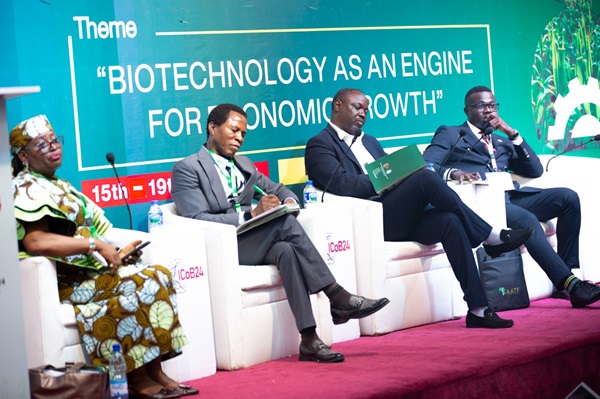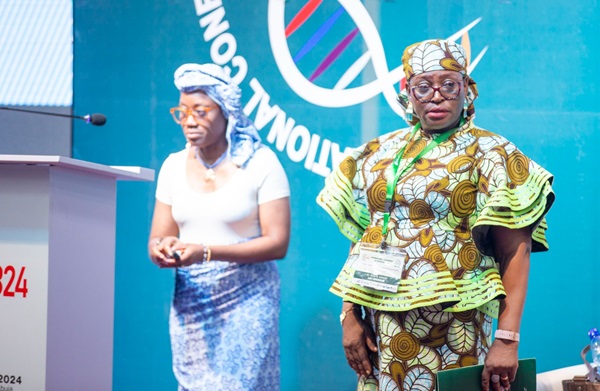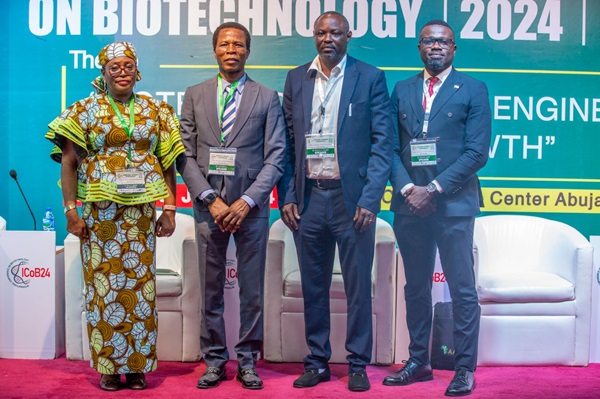
The Food and Agriculture Organisation (FAO) of the United Nations has highlighted the pivotal role of agricultural biotechnology in transforming agrifood systems globally.
This assertion was made by the UN FAO country representative to Nigeria, Dr. Dominique Koffy Kouacou during a high-profile panel discussion at the ongoing International Conference on Biotechnology 2024 (ICoB24). The conference, themed “Biotechnology as an Engine for Economic Growth,” is organised by the National Biotechnology Research and Development Agency (NBRDA) and its partners in Abuja.
Kouacou emphasised the dire need for advancements in agricultural biotechnology, noting that over 800 million people are malnourished worldwide, with more than 3 billion unable to afford a healthy diet. In Nigeria, over 18 million people are at risk of food insecurity. He highlighted that the demand for food is rising steadily due to increasing populations and incomes. However, the resources to meet this demand, such as land, water and soil, are finite and increasingly threatened by environmental degradation and climate change. Additionally, there is a growing demand for non-food agricultural products for energy and feed, further straining resources.
Represented by Dr. Ayodele Majekodunmi, the national project coordinator for FAO’s Emergency Centre for Transboundary Animal Diseases (ECTAD), Kouacou explained that agrifood systems must produce more food with greater nutritional value and less environmental impact. These systems must also be resilient to pests, diseases, climate change, and other shocks. He stressed that biotechnology in agriculture has significantly advanced the understanding of complex mechanisms in plants, animals, and microorganisms.

“As a specialised technical support agency of the United Nations, FAO continuously reviews traditional, maturing, and emerging biotechnologies for agrifood systems transformation. FAO facilitates knowledge sharing as a neutral broker through its various governing and statutory bodies and through direct support to country governments according to national priorities,” he stated.
Kouacou elucidated that biotechnology encompasses much more than genetically modified organisms (GMOs). It is essential in the livestock sector for developing high-yield breeds, feed production, and improving the diagnosis and monitoring of zoonotic and transboundary animal diseases. In the crops sector, biotechnology enhances drought tolerance, disease and pest resistance, sustainable agricultural practices, and farmer field schools.
“Biotechnology is not just for rich countries or big farmers; it is used successfully for smallholder farmers in developing countries. Despite the complexities of smallholder farmer production systems, agricultural biotechnologies can represent powerful tools to benefit smallholder farmers given the appropriate conditions and enabling environment,” he added.
Acting director-general of the National Agricultural Seed Council (NASC), Dr. Khalid Ishiag discussed the importance of high-quality seeds for improving crop yields, food security and sustainable agriculture. Represented by Dr. Ebirade Zidafamor, the director of seed coordination and management services, Dr. Ishiag emphasised that seed certification ensures seeds meet specific standards, guaranteeing genetic purity, physical quality and viability. Effective quality control processes, like testing and inspection, are vital for maintaining seed quality. He also stressed the need for strong regulatory frameworks to enforce seed quality and certification standards.
Acting Registrar of the plant variety protection (PVP) office at NASC, Dr. Okelola Folarin discussed the benefits and relevance of plant varietal protection to food security. He explained that plant varietal protection encourages the development of new crop varieties, promotes innovation in plant breeding, enhances farmers’ access to high-quality seeds, supports sustainable agriculture and protects the intellectual property rights of breeders. Nigeria’s PVP system is based on the International Union for the Protection of New Varieties of Plants (UPOV) model and offers legal protection for plant breeders’ rights, certification of plant varieties, plant variety registration, and dispute resolution mechanisms.

Dr. Folarin highlighted several challenges in Nigeria’s PVP system, including limited awareness and understanding among stakeholders, inadequate infrastructure and resources, and the need for harmonisation with regional and international frameworks. He recommended increasing awareness and capacity building, enhancing legal and institutional frameworks, strengthening collaboration among stakeholders, and leveraging technology and innovation for efficient PVP systems.
A program officer at the African Agricultural Technology Foundation (AATF), Dr. Bernard Ehirim discussed the role of seed technology in enhancing food security. He emphasised that seed technology is a carrier of new technologies, a basic tool for securing food supply, a principal means to secure crop yields in less favourable production areas and a medium for rapid agricultural rehabilitation in the event of natural disasters. He noted that Nigeria remains a leader in Africa in seed technology due to the adoption of innovative technologies such as precision farming, genetically modified crops and advanced irrigation systems. The area under cultivation in Nigeria increased by 7.3 per cent between 2017 and 2022, reaching 275.2 million hectares.
Ehirim recommended that stakeholders should rapidly recalibrate the focus on seed technology from merely a plant material for planting to recognizing its crucial role in food security.
Director of the agricultural biotechnology department at NBRDA and the panel moderator, Dr. Rose Gidado emphasised that biotechnology has the potential to revolutionise various aspects of Nigerian life, from healthcare to agriculture and environmental sustainability. She stated that biotechnology holds immense promise for transforming Nigeria for the better, describing it as a game-changer, transformer and a beacon of hope for a brighter, healthier, and more sustainable future.
The high-level panel session at ICoB24 aims to draw from the wealth of experts to examine how biotechnology and its products can facilitate food security and spur economic development in Nigeria. The session also aims to interact with participants to raise awareness about the immense benefits of biotechnology. This gathering underscores the critical importance of agricultural biotechnology in addressing global food security challenges and transforming agrifood systems, particularly in developing countries like Nigeria. Through continued innovation, collaboration, and strategic implementation, biotechnology can significantly contribute to a sustainable and prosperous future for all.


